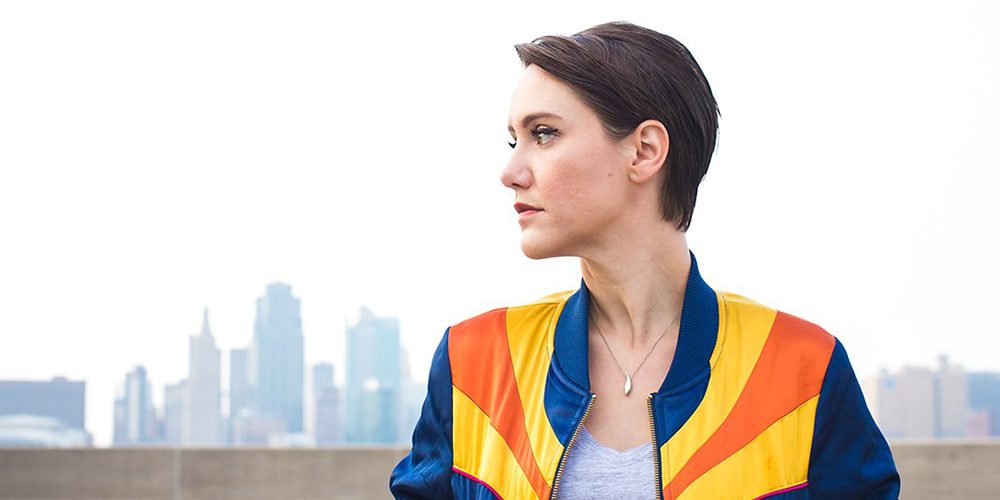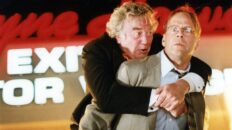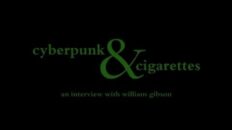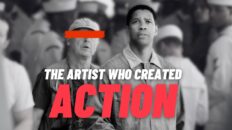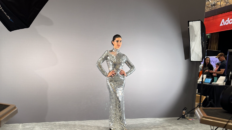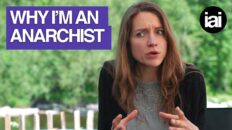It is rare to befriend people with raw, natural talent. It is rarer to befriend those people in the process of finding their creative voice. Micah Ruelle and I came to know each other through Tumblr blogs back in the early 2010s. We have taken part in an ongoing creative conversation ever since, whether through social media, email, in person, or through experiencing each other’s work over the last decade. However, when I found out in late 2018 that Micah would be publishing her first chapbook (a small collection of poetry that focuses on a singular theme), Failure to Merge, it felt like I was getting to witness the culmination of those conversations. I would get to witness, firsthand, the beginning of her maturing poetic voice.
Failure to Merge lives up to the expectations I had set in my mind. It is the perfect balance of all of the elements in which Micah excels. She does not pull any punches when in comes to examinations of the world and her own–and, by extension, all of our–”failures to merge” in this life, in our social and civic responsibilities, and with something or someone greater than us. The metaphor of the highway that sits at the center of this work has so many potential meanings and it feels like Micah capably juggles those potentialities throughout each composition. This collection of poems truly analyzes a country at a crossroads between the devils in the myth of Robert Johnson and the triumphalism inherent in the narratives Horatio Alger. And in the midst of this, Micah questions her own perceptions about the world. Perhaps more than anything, it is Micah’s kindness and humility that carries us across that taut wire.
I was so happy to get the chance to talk with Micah once again and to explore her new collection and to see how it reflects a snapshot of her history–a time I am pleased to have been “present”–and to explore the thin lines between life and art.
RUD: Tell us a little about yourself and what brought you to writing poetry?
RUELLE: I’m from a rural area outside of Des Moines, Iowa and I was raised in a pretty conservative, Evangelical household. I started writing poetry on Xanga—I’m gonna date myself, right?—and LiveJournal and Tumblr, eventually, but, I think it really began at home with [Christian] scripture and how much “The Word” was really discussed by my parents or in Bible study. At that time, Ravi Zacharias [a Christian apologist] was getting his start in the 90’s. There was this sort of big, intellectual revolution that was happening in Evangelical circles then. Zacharias was highly influential, creating a space in our home to begin talking about big ideas, which eventually became the norm. It might surprise some parts of America. While there were and are pockets that are highly skeptical of academia and what not, there are some hyper-intellectual some aspects of Christian, conservative culture. That’s my background. Reading scripture and hearing really intelligent people talk about it and the value of that really started my love of literature. This “sola scriptura” idea, this “word alone,”—it’s powerful.
My dad would read to me growing up, too. I had and still have to navigate some learning disabilities. But, my dad was extremely supportive. I’d follow along on the page as he read. He showed me how language was in the breath, the characterization, the musicality, and all that—it was beautiful. I joke around that my dad taught me the entire white, western canon, as we know it. But, honestly, I feel so blessed to have been raised in a household where that level of engagement was encouraged. Kids are so much smarter than parents give them credit for sometimes, you know? And it’s amazing what they pick up on. I feel like there was a great effort on behalf of my father to tell me that I was smart enough to do this or that, and that these words weren’t too big for me. I think that really helped me get the courage to overcome some of the aspects of my learning disabilities.
But poetry really began in those kinds of spaces and then eventually leaked out into the online venues—like the one in which we forged our friendship all those years ago!
RUD: And the conversation hasn’t stopped since regardless of the format! So, what was the process of writing this chapbook like for you?
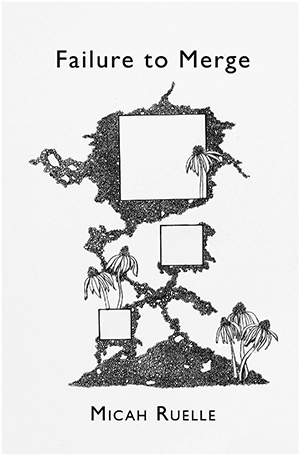 RUELLE: I began writing this chapbook during my Master of Fine Arts program at Texas State University. It was for a particular class taught by Dr. Cecily Parks. She was and is a wonderful professor who taught epistolary poetics. So, the whole entire course was focused exclusively about letters and poetry and, also, theories of letter-writing—which I didn’t even know was a thing, really. It’s its own academic endeavor which is fascinating. That really clicked with me for a number of reasons, but one aspect that I really loved about the course was that there is something so incredibly intimate about letter-writing as an art and form of communication. I think it’s one of the most generous sorts of writing we can write and read. If you ever read letters exchanged between famous historical figures—just wow, it is amazing what you can gather from those pieces of writing and how much wisdom can be there, and humor, and so much love. I really appreciate that tradition, so for me, the class really touched on so many things that I value as a person about connection and intimacy.
RUELLE: I began writing this chapbook during my Master of Fine Arts program at Texas State University. It was for a particular class taught by Dr. Cecily Parks. She was and is a wonderful professor who taught epistolary poetics. So, the whole entire course was focused exclusively about letters and poetry and, also, theories of letter-writing—which I didn’t even know was a thing, really. It’s its own academic endeavor which is fascinating. That really clicked with me for a number of reasons, but one aspect that I really loved about the course was that there is something so incredibly intimate about letter-writing as an art and form of communication. I think it’s one of the most generous sorts of writing we can write and read. If you ever read letters exchanged between famous historical figures—just wow, it is amazing what you can gather from those pieces of writing and how much wisdom can be there, and humor, and so much love. I really appreciate that tradition, so for me, the class really touched on so many things that I value as a person about connection and intimacy.
It’s also such a democratic way of entering into literature. When you read Jane Eyre, Charlotte Bronté says “Dear reader,…” and there is this implicit intimacy. It’s like she’s dropping you right in the middle of this story. It’s an artistic move, but, also, a way to bring someone close, because that “dear” isn’t just an address—it’s an invitation. And I love that. The process of writing these poems began somewhat organically because so many of the poems are written in this spirit of friendship that I have with this person, Will, to which the book is dedicated. It is, also, an exploration of my own identity. It was incredible to me how the early drafts were so easy to write, but then became incredibly difficult to edit. I wanted it to have a seamless feel. I don’t know if it accomplishes that, but that was the aim.
RUD: Do you have a ballpark of drafts you did?
RUELLE: I would say at least five per poem. But for the longer ones, somewhere between five to fifteen. Specifically, the ones that are more politically focused—I felt an immense responsibility to handle those with extra respect and care. Those felt like bigger things to carry across the finish line. I also wanted to create little reprieves in there. Ordering was really as difficult as editing.
RUD: This collection of poems is formatted as a series of letters written between you and I-35 which runs from Laredo, Texas to Duluth, Minnesota. What made you choose this specific highway and why was it paramount that you have this dialogue with an interstate?
RUELLE: I-35 continues on from Duluth, Minnesota into Canada and finishes out there and it goes from Laredo to Nueva Laredo, all the way through Mexico and ends there. It’s a real artificial distinction, though, right? When I-35 becomes these other highways. It’s just because different countries are running it—but it’s all the same road. It speaks to the man-made nature of borders, right? That’s our imposition, that’s not the geographical workings of those places.
But to answer your question more directly: it’s been an essential highway in shaping who I am my entire life. Both of my parents are from Minot, North Dakota, which is a town pretty much only military people will know about because there’s an Air Force base up there. When my dad became interested in real estate in the 90’s, he moved us down to Des Moines, Iowa. Every Christmas and Fourth of July, we’d go back up north, spending 14 or so hours in a car. It just became this normal mode of transit (from Des Moines to Minneapolis-St. Paul, veer off left, through Fargo, and eventually get to Minot).
After I graduated from high school in Iowa, I went to college at Bethel University in Minnesota, so I had to do that I-35 drive frequently. When I moved to Texas, then I was driving north from Texas to Kansas City. That’s a lot of hours spent in the car. And I started to realize I had developed this bizarre relationship with this highway going north and south and realizing that there had only been two chunks I had never driven before—from San Antonio to Laredo and from the Twin Cities to Duluth. So, I decided to finish the two ends of the drive. After I finished those two portions, I felt like I could finish the book.
But, I-35 is more than my personal relationship with it, right? It’s the unofficial highway running north and south through the country. Specifically, it’s a huge hub in regards to commerce and transit. There was and is so much socially and politically going on at our southern border, but specifically through I-35—everything from human trafficking, to drugs, to immigration. There have been long arguments about what should be done about the border and who should be let in, under what conditions and what all that should look like. I think it was—and is now even more so—very troubling to see the conversation shift in the direction it did—largely because of President Trump, particularly regarding his language to describe brown people—who are trying to escape for their lives! I was very distraught to hear the ways certain racist and dehumanizing terminology and ideas were being normalized in our culture.
When I began this project, I was asking myself a lot of questions: what can be done? How can I get involved? This collection was manifesting during this time where I was just beginning to understand where we were in regards to a much larger, longer context of American history. It just seems like this historical highway is so embodying of our time and how fraught with questions and possibilities and problems all of it is.
RUD: You bring up elements of injustice, specifically the racial unrest of places like Ferguson, Missouri, but the conversation between you and I-35 digs into the various ways you personally—and white people by extension—fail to understand and react well to the suffering and death of black people. What brought you to this dialogue in your poetry?
RUELLE: There are a couple of things I want to address in that question. The Ferguson poem was the first one of the collection because the reaction to Michael Brown’s death had just happened in this heavily televised and highly partisan way. What was insane to me was that I had just finished my undergraduate degree from the University of Central Missouri (I had transferred from Bethel to UCM)—which isn’t too terribly far away from Ferguson, but I was in Texas when I heard about it. I was just totally miffed by how overtly racist the coverage was, along with the verdict. Now, I had been to other parts of Missouri before—and this was before the NAACP had put out travel advisories for black people in Missouri—and there was no denying that there are some very real, active hate groups in Missouri. Even here in Kansas City, I just heard about an incident where a neo-Nazi band played a show here, and I was surprised that they were able to actually perform. Although, maybe I shouldn’t be. I feel like Kansas City embodies a lot of how there is still a North and South divide in the country. So, the project is just the beginning of what is ultimately an ongoing project for me to try to figure out how to navigate all of this. But I have been failing at this and I know we—collectively as white people—have failed to do this, too.
What is also interesting about that year is that I think that was the first year that I decided I was going to choose a woman to learn from every single year and that year I chose Nina Simone.
RUD: Yeah, I remember that.
RUELLE: Yeah, I love Nina Simone. She’s wonderful. She’s an amazing artist. There are so many smart things that she talked about in regard to the creative process. What it means to be an artist. What it means to be black. What it means to be a black woman. I think those were important things for me to hear throughout the entire year, because just by being in her presence, just by listening to her and her interviews, and watching her concerts through YouTube, she was teaching me so much and continues to teach me so much from beyond the grave. But she said this thing that I would love to share with you from an interview:
We will shape and mold this country or it will not be molded or shaped at all anymore. I don’t think you have a choice. How can you be an artist and not reflect the times?
It’s so profound. It speaks to an intentionality. This idea that we have to do the work of creating a good world, otherwise, by default, it won’t be shaped and molded in the way that we want. To put things in perspective: Ferguson was, of course, a response to the killing of Michael Brown, which happened in 2014. It’s been five years since then! But we have made so little progress. In fact, Antwon Rose, a 17-year old black boy unarmed and scared and running for his life and was killed by a police officer last June after being shot in the back 3 times. That police officer was found not guilty in Pittsburgh recently. That just goes to show how little progress we have actually made. That’s horrible! And that’s extremely frustrating to realize that I started this project in 2014 and it’s 2019 and I feel like it’s still on point in a way that I think is a problem. I can’t imagine what it’s like for Antwon’s family and community—and the black community at large, to be navigating—once again—such a horrific loss. This book should feel dated because of when the heart of this project began. But, then again, we know that there is a looooong history of these sorts of violent, fatal encounters with police officers that end in black citizens dying.
We know there are things that can be done as far as de-escalation training, which used to be a huge part of what a lot of police officers were trained to do, historically. There are so many aspects of our government, our police force, our justice system that needs to be reformed.
We could talk all day about this, and I know many people may disagree with me on this point, but I think it’s worth mentioning (and it’s something my friend gave me the ok to share).
There was a young, black man that went to my Christian school who was a few years older than me, but we were really good friends—still are very good friends. And he would tell me stories about the sorts of things that would happened to him in Iowa, the sorts of run-ins with police officers he would have. He’d get pulled over, and often, for no reason. I think the worst story, to me, is the one where he isn’t in a moving vehicle at all. This story is comical in its absolute absurdity, but I think helps depict what black Americans are often up against. One time, he was sitting outside a comic book store in his car reading a comic he had just bought—I think he was on a lunch break? And a police officer tapped on his window and asked him what he was doing and he looked the officer, as one might—rather dumbfound by the question—and said “Uh…reading a comic book?” And this is the sort of thing that happened Iowa! Where “nothing racist” happens. Now that we’re much older, I know there are much worse encounters, and I worry for him when he’s on tour, traveling around out there.
He and I began this dialogue when I was in junior high, and I was starting to feel the beginning schism between the media (I grew up in a house where Rush Limbaugh was always on in the car and Fox News was always on at home) that I was exposed to and the humanity I was experiencing in my everyday life, my family, my church, and through this friendship. But, everything got really simple for me when a simple question came to me: do I believe my friend or not? And it’s really that simple. Do I honestly believe that my friend is telling me the truth when he tells me these stories about what happens to him when he goes out in the world? At the end of the day, we don’t have a relationship if I don’t believe him. There’s no point in pretending that we have a relationship at that point if I choose to not trust him.
That was probably the precursor to the project, because it came down to whether or not I believed all of these people who have had sons, daughters, wives, husbands, aunts, uncles—go missing, get hurt, or killed. I think as a nation, collectively, we’re at a place where we have to decide: do we believe black and brown people or not? It’s really that simple.
I think there is—for as much big-picture focus as there can be—a big personal dimension to this, too. My mom has always emphasized the idea that if everyone just takes care of their little part of their sphere: where you can become a better person, and contribute and listen better and be more compassionate and do more good things in the world. If everyone just did that, the world would be a better place.
RUD: Would you consider this collection within the subgenre of literature concerned with the open road or the road trip narrative?
RUELLE: Absolutely. I think we all go through our 20s—maybe I shouldn’t speak for others, but for me, as a white girl from Iowa—thinking the world’s our oyster and I’m just going to explore everything! That kind of narrative plot line runs through a lot of things in white, coming-of-age movies, like “Crossroads.” But I think really this collection helps reflect the time I was growing up, even though it’s a little later than that chapter in life. I’d love to share with you one of the excerpts I was going to have at the beginning of the collection. Of course, from Walt Whitman’s “Song of the Open Road”:
O public road, I say back I am not afraid to leave you, yet I love you,
You express me better than I can express myself,
You shall be more to me than my poem.
It’s so good. I think the thing I’ve always loved about his work was this democratizing factor where he includes everyone. It’s just a shame he couldn’t do that in his real life. From his non-poetry writings, we know he actually held some very racist views. But, as my friend, Tomás, has said, “the art is smarter than us.” So, we are lucky we can experience something like that as a human being.
RUD: I love the various layers of how these letters function. You are addressed as “M” while I-35 is addressed as “I.” There is the sense where you a conversing with yourself, but also with this nation by way of its highway. However, you are also conversing with time and age in that the highway represents something older than us, has seen more things, been through more history, and has wisdom to spare. Were these layers there from conception or did they come to you in the process of writing this series?
RUELLE: There’s a couple of things going on there. My academic background is in literature and theology, so I think this idea of having a relationship with a timeless being feels really natural to me. But, one of the surprising discoveries for me during my time in Texas State was discovering this long tradition of the erotic and divine love as being mirrors for one another in traditions of both ancient Indian love poetry, as well as Middle-Eastern forms. These ancient forms and traditions helped inform me as I was drafting these poems.
Around the time I was writing the collection, this post-apocalyptic video game called “The Last of Us” had come out? Or maybe I had just heard about it for the first time? Anyway, the game begins in San Marcos, Texas. You are this character having to go—and I’ve forgotten because it’s been years since I’ve seen it—on the road and are essentially trying to save this little girl whose DNA has the cure for whatever has turned humans into zombies. My friend told me about it and it got me thinking about what in a post-apocalyptic America would outlast us.
I’ve often wondered what short-sighted problems of ours will end up looking ridiculous in the long run, versus—say, more insidious, deadly problems we might have ignored as a collective. For example—in the course of this conversation, we’ve already touched on racism in regards to the treatment of immigrants at our southern border and of black Americans, but we have not touched on the horrible treatment suffered by native populations at the hands of colonizers to build America, Mexico, or Canada. The body count alone is something that will always haunt us as not just a nation, but as a continent—not to mention all the cruelties and atrocities that have been inflicted upon native populations. That isn’t just something that just disappears with modernization. There is really no getting away from that part of history.
RUD: Not only that, but in the making of the highway itself.
RUELLE: Right! Exactly. And the civilizations that comes from that, right? Oof. So, there are the big issues, but then there are the fleeting problems where I think the highway [in my poems] tries to stifle some of that. It’s really hard, for me, to imagine having enough experience and wisdom to be able to differentiate those issues with clarity and precision all the time. As much progress as we all want to make, on multiple levels—it’s easy to get lost in the weeds.
I think, on the most basic of levels, change has to begin with basic protections and rights of black and brown and gay people in this nation. That has to be the primary focus. It’s important to come at those problems from multiple directions, obviously, but safety should not be an issue. It should be a given.
When I finished the project, I had this feeling of a continual conversation that will go on forever. It’s also an imperfect project. I love the fact that the title came to me and it has the term “failure” in it because, on some level, I know it’s a failure to do something. The whole thing is a failure to fully articulate where we are in time. It’s impossible. But there’s an attempt.
RUD: On the other side of your collection, now that it is released into the wild, how do you now see your relationship with I-35, or I? Has it changed you? What has it taught you?
RUELLE: It’s changed—or maybe I’ve changed?—considerably.
I’m in the process of moving back up to the Twin Cities area—hopefully by the end of the year. And I feel like a different person than the one that wrote the collection, though. There’s a dissonance I feel when I read the collection because of everything that was getting hurled at me during that time. At the beginning of the collection, I’m engaged—but, by the end, I’m not. There is really no addressing it and it doesn’t get brought up again. Also, my father was diagnosed with brain cancer which doesn’t get mentioned in the book at all. It was just too difficult to write about.
This is the book that embodies all those naïve ideas I had about possibilities. I don’t say that in a disparaging way. I still believe there are possibilities in life and I do think that our moral and spiritual obligation is to bring about justice in our world. The idea that the work will happen overnight or be easy—that is all gone. I have no illusions about how much work it will take about bringing that.
I’m in the early stages in the process of converting. One of the great things about becoming a Jew is that there is this huge emphasis in Jewish beliefs that you bring the kingdom of Heaven. It’s not something that you should just wait until you die and you get it. Part of being a Jew is embodying that work of bringing justice. You’re part of the faith and part of the family and it’s your obligation to do your part and make this place holy outside of just the Sabbath. That is very profound and very unique to Jewish faith in a concrete way. It has caused me to think about my life and faith differently. Yeah, the journey is weird and I’m headed back north and I’m excited, but I’m a little older and a little more seasoned. Hopefully, for the better. I’m grateful for this highway that raised me.
RUD: Where can people order their copy and find your other work? Find you on the internet?
RUELLE: I don’t have a website up yet, but you can pre-order the book through Finishing Line Press. It’s only on pre-order until April 22. And you can always find me on Instagram @mshapes.


